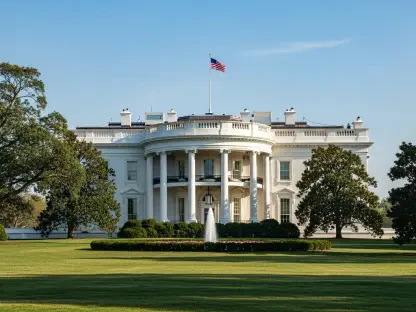The current political landscape is marked by Congress’s Republican initiative aimed at dismantling financial regulations introduced during the Biden administration. Spearheaded by the House Financial Services Committee, this movement hinges on the belief that regulatory oversight stifles economic growth and innovation. With a focus on promoting competition and easing the burden on small financial institutions, Republicans advocate for a significant shift in approach to ensure the vitality of the banking sector. This critique not only reflects broader ideologies within the party but also signifies an ongoing debate on the balance between regulation and economic development.
Efforts to Reshape Financial Regulations
Targeting Regulation II
Republicans have set their sights on reevaluating Regulation II, a rule that places a cap on debit card interchange fees, stipulating a limit of 21 cents per transaction. This regulation, initially intended to promote fair market practices, is now under scrutiny for its impact on small community banks and credit unions. House Republicans claim that such a cap limits the profit margins of these institutions, potentially jeopardizing their financial stability. As smaller banks and credit unions play a crucial role in serving local communities, Republicans argue that enabling their growth is essential for fostering a competitive financial environment. In light of these concerns, they propose that the Federal Reserve reevaluate and adjust these regulations to better support smaller institutions while balancing market fairness.
This call for reform reflects a broader Republican belief that excessive financial constraints can dampen innovation within the industry. The proposal to revamp Regulation II underscores the importance of creating a more dynamic and adaptable financial ecosystem that accommodates the needs of smaller entities. By lessening regulatory restrictions that are perceived to disadvantage these banks, Republicans aim to stimulate economic growth and encourage healthy competition. Such measures could pave the way for these institutions to thrive, benefiting both consumers and the wider economic landscape. Nonetheless, any adjustments will require careful consideration to avoid unintended consequences that might tilt the balance too far in favor of deregulation.
Basel III and Capital Requirements
The Basel III endgame proposal is another focal point in the Republican agenda to ease financial regulations. Designed to enhance the resiliency of banks by strengthening capital requirements, this global framework has faced opposition within the GOP. Critics argue that the final phase of Basel III imposes overly stringent requirements on U.S. banks, potentially hampering their ability to lend and thus curbing economic growth. The contention is that these excessive capital requirements could restrict credit availability, impeding businesses and consumers alike. To remedy these issues, Republicans have recommended that U.S. regulators reassess certain components of Basel III to prevent adverse effects on the banking sector’s contributions to the economy.
Revisiting the Basel III regulations aligns with the Republicans’ broader deregulatory ethos, which seeks to strike a balance between ensuring financial stability and encouraging economic expansion. The call for adjustments is not about completely dismantling the framework but rather tailoring it to the particularities of the U.S. financial system. Should U.S. regulators heed these recommendations, a more balanced regulatory structure may emerge—one that protects against financial crises while supporting the banks’ capacity to lend. This approach aims to bolster economic growth and a robust banking sector, key goals for the current Republican leadership in Congress.
Oversight of Consumer Financial Protection Bureau Rules
Overdraft and Late Fees
The Consumer Financial Protection Bureau (CFPB) has faced Republican opposition concerning its rules on overdraft and credit card late fees. These regulations restrict the conditions under which financial institutions can impose such fees, aiming to protect consumers. However, Republicans have argued that these rules are overly burdensome, restricting financial institutions’ operational flexibility and inadvertently limiting credit availability. By imposing tight controls on overdraft and late fees, GOP critics claim, the rules could deter banks from extending credit, particularly to those who already face challenges in accessing financial services.
Advocacy groups like the R Street Institute have aligned with Republican efforts to revise the CFPB’s regulations, emphasizing the importance of ensuring that financial institutions can adapt to changing consumer needs without excessive regulatory constraints. While the intent of the CFPB’s rules is to prevent consumer exploitation, Republicans suggest that a more balanced approach could achieve consumer protection without stifling credit access. By advocating for a reevaluation of these restrictions, Republicans aim to foster a financial environment that both protects consumers and sustains the lending capabilities of financial institutions, particularly those serving underserved communities.
Calls for Better Agency Oversight
Though the GOP is critical of the CFPB’s reach and perceived lack of oversight, it stops short of calling for the agency’s dissolution. Instead, Republicans recommend enhancing transparency in the rulemaking process and conducting thorough impact analyses to ensure regulations align with economic realities. By advocating for rules consistent with the Administrative Procedure Act, they emphasize the need for public involvement to create a balanced regulatory framework. This involves revisiting rules enacted without proper adherence to procedural norms, promoting a regulatory approach that facilitates competition and consumer protection.
While Republicans criticize various aspects of the CFPB’s operations, they recognize the necessity of its role in overseeing financial markets. Their criticisms are not calls for dismantlement but for reform. The aim is to ensure that CFPB regulations are both impactful and fair, fostering an effective and informed regulatory environment. By emphasizing a balanced approach, they seek to ensure agency actions truly reflect the interests of both the industry and consumers. Fostering oversight with proper checks can lead to regulations that encourage competition and innovation in the financial sector while safeguarding consumer interests.
Broader Republican Deregulatory Endeavors
Addressing Banking Standards and Reputational Risk
Beyond focusing solely on Biden-era regulations, the Republicans have broadened their deregulatory efforts to encompass other financial issues. Among these is the concept of debanking and scrutiny over the “reputational risk” standard used by prudential regulators. Senate Banking Chairman Tim Scott, a vocal figure in this discussion, has introduced legislation aimed at eliminating “reputational risk” as a factor in bank regulatory decisions. This move signals an effort to redefine the criteria guiding regulatory oversight, aligning them with a philosophy that seeks to minimize what Republicans see as unnecessary interference.
Such efforts highlight a commitment to revisiting longstanding regulatory norms that Republicans argue may hinder economic dynamism and innovation. By challenging existing standards and advocating for legislative change, the party underscores its dedication to ensuring regulatory frameworks remain in tune with contemporary banking practices. This approach reflects a broader Republican strategy to foster an environment where economic activities can thrive with minimal bureaucratic hurdles. Efforts to address “reputational risk” underscore a desire to establish clearer, more objective regulatory criteria that focus on financial stability rather than subjective assessments.
Intrinsic Party Tensions
The current political climate is characterized by a Republican-driven effort in Congress to roll back financial regulations implemented during President Biden’s tenure. This initiative, led by the House Financial Services Committee, is fueled by the conviction that regulatory oversight can hinder economic growth and stifle innovation. Republicans argue that by relaxing these regulations, they can promote competition and reduce pressures on small financial institutions. They believe these reforms are necessary to revitalize the banking sector’s viability and ensure a dynamic, robust economic environment. This stance highlights a fundamental ideological divide within the political spectrum, reflecting a larger discussion about finding the optimal balance between regulation and economic progress. Such debates have persisted for decades, revealing differing opinions on how best to foster a thriving financial landscape. While Republicans focus on reducing bureaucracy to spur growth, others caution that protecting consumers and maintaining stability is equally essential.









